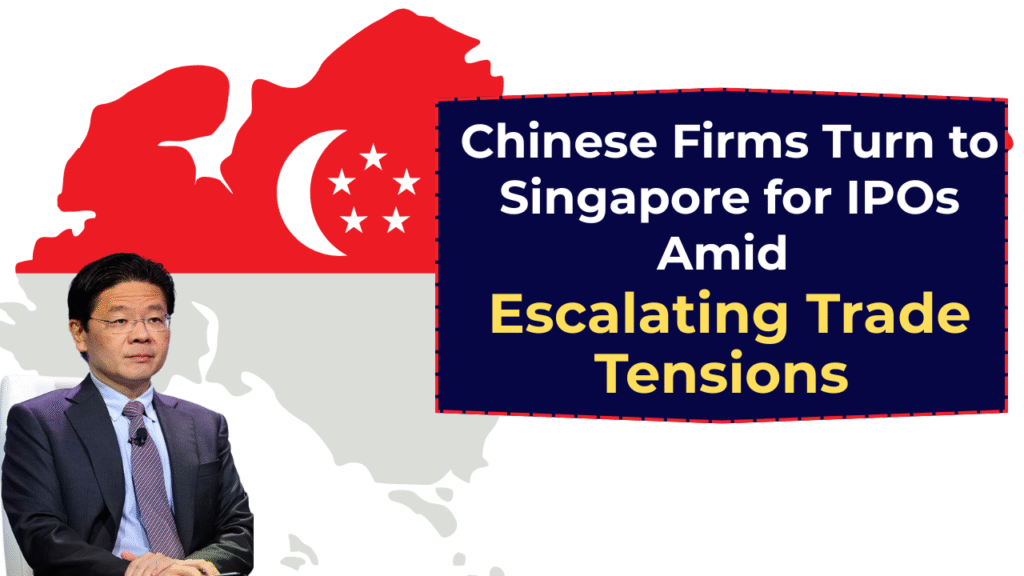Chinese Firms Shift Focus Amid Geopolitical Tensions
Amid escalating tensions between China and the United States, an increasing number of Chinese companies are considering Singapore as an alternative destination for public listings. This shift reflects growing uncertainty in U.S. capital markets and underscores Singapore’s emerging role as a strategic financial hub in Southeast Asia.
The U.S.-China trade war, characterized by tariffs, export restrictions, and political scrutiny over data security, has significantly disrupted cross-border investments and corporate strategies. For Chinese firms, especially in the tech and manufacturing sectors, these pressures have made it increasingly difficult to raise capital through traditional avenues such as the New York Stock Exchange (NYSE) or Nasdaq.
Singapore’s Appeal Grows
Singapore, renowned for its political stability, transparent regulations, and mature financial infrastructure, is fast becoming a magnet for companies seeking to tap international investors without facing the geopolitical risks associated with Western markets.
In recent years, the Singapore Exchange (SGX) has been working to attract more high-growth companies, particularly from the Asia-Pacific region. Its dual-class share structure, regulatory reforms, and strong institutional investor base make it a compelling alternative.
“Singapore is a gateway to ASEAN markets, and its regulatory environment is familiar and business-friendly,” said a senior executive at a Chinese fintech firm reportedly exploring an SGX listing. “We want to be close to our customers and reduce exposure to unpredictable political climates.”
Rising Number of Relocations and Listings
Several Chinese companies, particularly in technology, healthcare, and green energy, have either started preparing for initial public offerings (IPOs) in Singapore or are considering secondary listings. While exact figures are confidential, capital market advisors report a noticeable uptick in interest and engagement over the last 18 months.
This trend follows moves by larger Chinese tech firms like Alibaba and JD.com, which have already sought dual listings in Hong Kong. Now, mid-sized companies and startups are looking toward Singapore to diversify their investor base and avoid overreliance on Western capital.
Regulatory Pressure in the U.S.
The shift is also being driven by tightening regulations in the U.S., particularly those concerning audit transparency and data governance. The U.S. Holding Foreign Companies Accountable Act (HFCAA), signed into law in 2020, mandates that foreign companies listed in the U.S. comply with Public Company Accounting Oversight Board (PCAOB) audits. Non-compliant firms risk delisting after three consecutive years of non-compliance.
Many Chinese companies, due to legal restrictions in China on cross-border data sharing, struggle to meet these U.S. requirements. This has led to heightened scrutiny and the potential for involuntary delistings, prompting companies to seek safer listing environments.
Singapore’s Government Support
Singapore’s government has been actively supporting innovation and economic diversification. Initiatives like the Financial Sector Development Fund (FSDF) and the Economic Development Board (EDB) provide funding, tax incentives, and infrastructure support to encourage both domestic and foreign companies to invest and grow in the region.
The Monetary Authority of Singapore (MAS), the country’s central bank and integrated financial regulator, continues to work closely with SGX to enhance listing frameworks, support capital market growth, and position Singapore as a hub for sustainable finance.
Challenges Remain
While Singapore offers a stable environment, it is not without limitations. Its smaller market size, relatively lower liquidity, and a less aggressive investor base compared to New York or Hong Kong can be concerns for high-growth firms looking to raise substantial capital.
Moreover, brand visibility and prestige associated with a U.S. listing still hold sway for some Chinese firms, particularly those with global ambitions. Nonetheless, the pragmatic choice of diversifying listing venues is becoming increasingly attractive amid the volatile geopolitical environment.
Regional Implications
This pivot toward Singapore could also signal a broader reorientation of global financial flows. As more Chinese companies set up regional headquarters or list in Southeast Asia, Singapore’s position as a neutral and strategic financial hub is likely to strengthen.
Experts say this could have long-term implications for capital market dynamics across Asia, as firms seek jurisdictions that balance regulatory certainty with investor accessibility.
“Singapore stands to benefit from the decoupling trend,” said a capital markets analyst based in Hong Kong. “But it will need to keep evolving to compete not just with Hong Kong, but with emerging exchanges in markets like Jakarta and Kuala Lumpur.”
Future Outlook
While the U.S.-China trade war shows no sign of immediate resolution, businesses are already adapting to a new global order. For Chinese companies facing uncertain prospects in American markets, Singapore offers not only safety but strategic growth potential in one of the world’s fastest-growing regions.
As trade tensions continue to shape investment decisions, Singapore’s role in global capital markets will likely expand. Whether this trend will lead to long-term structural shifts remains to be seen, but for now, the Lion City is roaring louder than ever in the race for Chinese IPOs.




